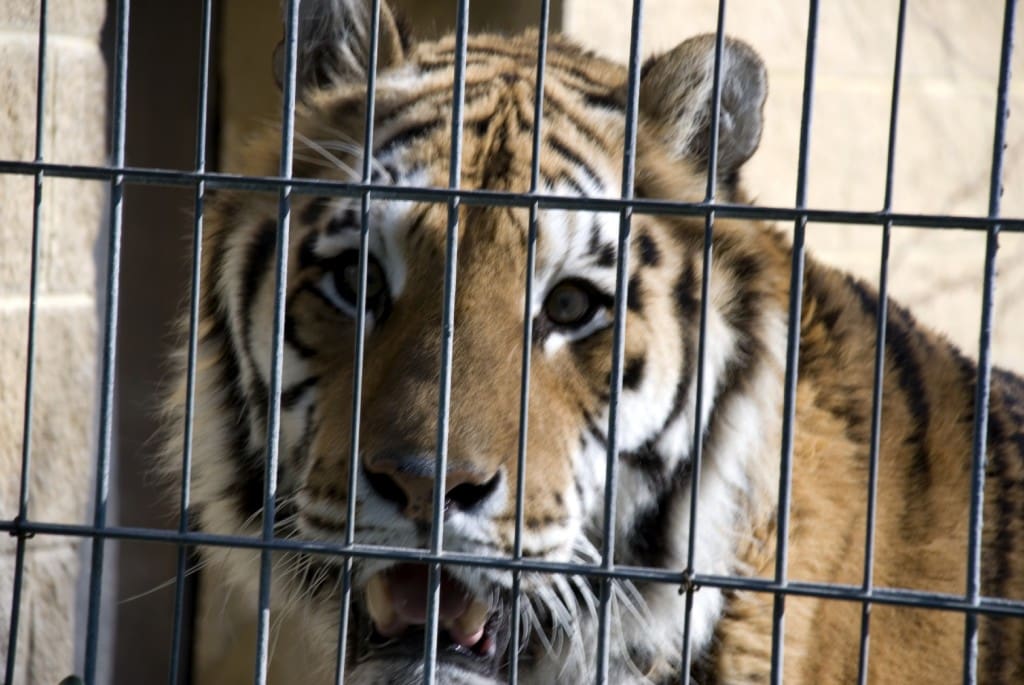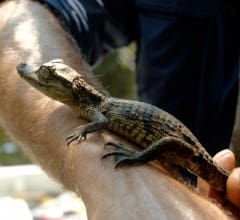
In recent weeks, two news stories have emerged that illustrate how businesses that exploit animals cultivate images of legitimacy while hiding a dark reality.
In B.C., the case of Mike Hopcraft, who has promoted himself as the “Reptile Guy”, made headlines when his facility in Mission was raided by the BC SPCA and a number of animals were seized. Hopcraft claims to rescue and rehabilitate animals and is often featured on morning news shows as a reptile rescue expert. Yet court documents obtained by Animal Justice tell a different story.

In a blog post, Animal Justice says the documents describe what was found in the BC SPCA raid: “Investigators repeatedly found dead animals, animals in such severe distress that they needed to be euthanized, infected and injured animals, emaciated and underweight animals, unsanitary tanks, overcrowding, cramped conditions, mouldy feces in tanks with live animals, animals with no water or undrinkable water, exposed wires, and broken lights.” The post says the court documents also stated: “When Hopcraft was informed [two emaciated animals, one with four broken legs] were going to be seized he kicked a chair across the office and was escorted outside by the RCMP.”
In another revealing case, Michael Hackenberger, owner of Ontario’s Bowmanville Zoo was exposed allegedly abusing a tiger. In an undercover video taken by PETA, Hackenberger uses a whip to motivate a male Siberian tiger called Uno. In a so-called rebuttal to the video, Hackenberger admits to striking him twice, as quoted in the Toronto Star: “Maybe I viciously whipped the ground. Maybe I viciously whipped the air, but I did not viciously whip that tiger,” he said. “I didn’t strike the tiger except twice to get him turned around.” In another undercover video, Hackenberger talks about training wolves, stating: “You smack ’em and they generally fold like a house of cards.”
Yet the Bowmanville Zoo, which is accredited by CAZA (Canada’s Accredited Zoos & Aquariums), attracts thousands of visitors and even praise in the media. Positive PR and marketing by the zoo has convinced many people that it really cares about animals. But when the veil slips, a disturbing reality is revealed.
 Over the years, VHS has seen a number of animal businesses exposed for what they really are. In 2010, Cinemazoo, an animal rental agency based in Surrey, was investigated for animal cruelty by the BC SPCA. The agency was forced to transfer a number of animals to more appropriate facilities. It is still in operation, renting out animals for advertising, birthday parties and corporate events.
Over the years, VHS has seen a number of animal businesses exposed for what they really are. In 2010, Cinemazoo, an animal rental agency based in Surrey, was investigated for animal cruelty by the BC SPCA. The agency was forced to transfer a number of animals to more appropriate facilities. It is still in operation, renting out animals for advertising, birthday parties and corporate events.
In 2009, VHS was instrumental in exposing animal abuse at the Mountain View Conservation and Breeding Centre in Langley, leading to cruelty charges being recommended by the BC SPCA. Crown Counsel declined to proceed with charges but the centre divested itself of most of its exotic species. Prior to the revelations, the centre was said to have a “superb” record and was also CAZA accredited.
And who can forget the 2010 massacre of 56 sled dogs in Whistler, B.C.? Robert Fawcett, an employee of Howling Dog Tours Whistler Inc. was sentenced to three years’ probation in 2012 for causing unnecessary pain and suffering to nine of the dogs. Fawcett claimed he had been ordered to cull the company’s herd of dogs when tourist demand dropped off after the 2010 Winter Olympics. Until the incident, the sled dog tour industry retained a rosy image of dogs pulling sleds of happy tourists through a winter wonderland. But the attention brought by the case revealed the industry practice of culling unwanted sled dogs and the outdoor tethering of dogs for long periods.

While Mr. Fawcett was portrayed as a “bad apple” by the industry, in fact he served as vice-president on the board of Mush with Pride, a leading international sled dog industry group (until he was voted off when the Whistler massacre became public knowledge). He was a well-known and leading figure in the sled dog world.
These revealing incidents should serve as a reminder to the public that businesses that use animals for profit need to be constantly scrutinized and their claims should be treated with extreme scepticism. Anyone who patronizes zoos, aquariums, circuses, rodeos, sled dog tours or races, horse races and other animal entertainment businesses should realize that the positive images they are sold are unlikely to match the harsh reality the animals experience.
When animals are treated as commodities their welfare will always be compromised.

2 replies on “The truth behind animal businesses”
I think another frustrating part of this story is that many of these businesses hide themselves behind the facade of being a “rescue”.
They are not rescues. They are businesses.
They call themselves rescues but
1) no credible rescues stand up and support them when situations like this occur
2) no credible rescue have the set ups, fancy facades, buildings and fleets of vehicles that they do
3) no credible rescue goes in and charges hundreds of dollars for educational presentations
4) no credible rescue will ever, ever breed or buy animals for display or educational purposes
5) no credible rescue uses money made off of the animals to support their “rescue work”
It sad and frustrating that they use the word rescue because it takes away from the hard work and efforts of true rescues who don’t have the time for the showmanship all of these other groups above have in common.
The moment we believe that other species are here for our own use, we open the door to all manner of abuse.